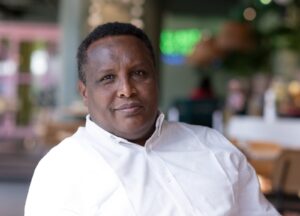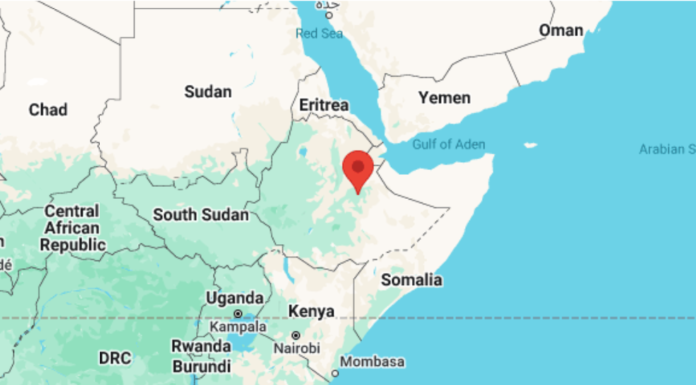Sabre-rattling by Egypt in Somalia and Ethiopia’s offensive statements against Somalia’s sovereignty are burying the hope to defuse the tension between Somalia and Ethiopia, which might also lead to geopolitical crisis, however immediate intervention for peace is vital.
Leaders of Somalia and Ethiopia are somehow tarred with the same brush, for not admitting the biding and unchangeable relations between the two countries, while blindfolding the reality that these two countries will always be neighbors and inseparable in the geographic and geopolitical aspects.
Ethiopia’s disdain to Somali government further fuels the tension between the two countries and in this way Ethiopia not only loses its interest in Somalia but also destabilizes the whole of Horn of Africa.
Ethiopia’s Political setbacks
Abiy Ahmed, the Prime minister of Ethiopia – a landlocked country over a 100 million people – is moving to seek a port or naval base in the Red Sea either by diplomacy or by force. According to Professor Redie Berekteab, PM Abiy Ahmed decided to deflect criticism over local conflicts and deepening economic crises. Mr. Redie believes that it may have maritime access through compromise and deals with its neighbors with subverting the region.
Somalia’s internal problems and the Al-Shabaab offense
Somalia government has been battling Al-Shabaab, an insurgent group affiliated with Al-Qaeda, who targets government forces, AMISOM and also civilians. The government launched an offensive in 2022 with the help of local militias known as Macawisley, but that offensive drove Al-Shabaab many villages and towns.
But, the war with Al-Shabaab seems far from ending. Prof. Afyare A. Elmi, a renowned Somali researcher and scholar, offers timely and well-grounded suggestions in an article he penned for the Middle East Council on Global Affairs, “Engaging Al-Shabaab in Somalia: Military Failures and the Merits of Dialogue.” In this article, Mr Afyare describes different stages of the military campaign against Al-Shabaab since 2007.
Examining the situation from different aspects, Afyare puts forward many scholars’ and practitioners’ conclusions: Somalia’s government should explore ways to negotiate Al-Shabaab. Mr. Afyare understands the existence of numerous challenges but sees as well multiple avenues for engaging Al-Shabaab, but this success needs the engagement of a trusted mediator and full support of Somalia’s allies and backers.
Many analysts believe that Somaliland’s newly elected president Abdirahman Mohamed Abdullahi “Irro” can significantly defuse tensions between Somaliland and Somalia.
Due to his diplomatic background, it is highly probable that President Irro will resume Somalia-Somaliland talks, a move that might alleviate the tension in the Horn of Africa
African Union (AU) lacks in finding African problems for African Solutions
African Union (AU) has failed to find African problems for African led solutions like the crisis of West Africa, Sudan, Somalia and Ethiopia, Congo and Rwanda etc. This makes the continental body toothless.
Tripartite Ageement: Ethiopia, Somalia and Eritrea
A short-lived alliance between Somalia, Ethiopia and Eritrea only lasted in a few years. Somalia’s then president Mohamed Abdullahi, Eritrea’s president Isaias and Ethiopia Prime Minister Abiy Ahmed signed a tripartite agreement in 2018. However, the trio excluded the leading political elder and respected figure in the Horn of Africa, President Ismail Omar Guelleh of Djibouti. President Guelleh is considered as an elder and a real treasure of the region due to his experience and enthusiasm for the betterment of the region.
The close relation between Abiy, Farmajo and Isaias were expected to end the crisis in the region, especially the rift between Djibouti and Eritrea. The trio’s move to ignore Guelleh’s involvement in the alliance of Horn of Africa was diplomatic mistake, which made the alliance ephemeral.
Now, in 2024,similar alliance based on mutual interest has been formed. Somalia, Eritrea and Egypt signed a tripartite agreement against Ethiopia. This trio has fresh and old diplomatic conflicts with Addis Ababa, after Abiy voiced his ambition to get landlocked Ethiopia a passage to Red Sea. Again, Djibouti is not officially part and parcel of this alliance, but its possible to have on-board, Should Somalia, Egypt and Eritrea leaders understand the importance to solve Djibouti-Eritrea border dispute.
Ethiopia has not accustomed to having it’s words questioned on Somali issues in the last 30 years, in which Somalia was coping with first civil war and multifaceted war ranging from religious to interest driven.
Regardless Somalia’s dependence on international support for its stability and budgetary sides, Somalia has legitimate, fully recognized government and free to collaborate with every country it sees its interest and Somalia’s president Hassan Sheikh Mohamud comprehends fully this and practiced indefatigably.
Ethiopia downplays Somalia
Magniloquent and boasting statements and actions of Ethiopian leaders – to downgrade the legitimacy and right of Somali leaders to self-determine and have their political tie-ups with every-and -each country in the world – are abetting and nurturing hostilities in the region.
Abiy Ahmed has last year presented vociferously his desire to regain Ethiopia’s presence on the Red Sea after Eritrea got its independence from Ethiopia, a move that expelled Ethiopia out of the Red Sea. Abiy’s declaration bewildered Red Sea countries, subsequently caused vigilance across the region and expedited diplomatic approaches between Eritrea and Somalia.
Despite, Ethiopia ethno-political clashes and uncertain situation coupled with Somalia’s prolonged woe inherited from terrorist elements and clan –based power sharing – current crisis is putting both countries on the edge of civil unrest, in addition to Sudan’s destructive and brutal civil war.
Djibouti
Djibouti enjoys steady government led by experienced, assertive leader compared to the rest of Horn of Africa leaders.
Somalia and Egypt sign pact
Somalia’s president Hassan Sheikh Mohamud signed a treaty with Egypt on aiming at helping Somalia war against terrorism and foreign aggressions with the purpose of protecting Somalia’s sovereignty. Incontestably, this treaty means in the diplomatic language security cooperation but in reality, it is a military cooperation between Somalia and Egypt against Ethiopia’s intention to gain naval base in Somalia’s Red Sea portion.
Egypt’s propound to participate peacekeeping mission in Somalia under the AU/UN mandate created frustration on Ethiopian leadership, who in conflict with Egypt over Nile river. Subsequently, Somalia’s defiance minister Abdukadir Mohamed Nur announced that Ethiopian armed forced will not participate in the upcoming AU peacekeeping mission in Somalia, which is set to start in January 2025.
Ethiopia assumes comprehensibly that Egypt is going to destabilize Ethiopia and stop Grand Ethiopian Renaissance Dam (GERD) built by Ethiopia – the dam is one of the largest hydropower projects in the world and the largest in Africa – which effects the downstream of the Nile river.
Ethiopia seeks Alliance to counter its neighbors’ alliance
Ethiopia convened in Addis Ababa the first African Defence ministers’ conference on 15th to 18th October 2024 playing a facilitator’s role according to ENA news agency. The theme of the conference is “Africa: United in Peace, Strong in Security”, and it comes to a time Ethiopia is avid for access to Red Sea by hook or by crook.
The move by Ethiopia’s leadership to arrange a conference for the ministers of defiance at this time the region is on the edge of war was to divert the attention of the African leaders at the conference, while otherwise shows Ethiopia’s enemies that it gaining continental support for its actions.
A glimmer of hope for peace
Qatar, Finland and Turkey have multifaceted relations with Horn of Africa countries with the Finnish government prioritizing peace mediation its foreign policy. Finland under the leadership of President of the Republic of Finland Alexander Stubb and the Ministry of Foreign Affairs accelerated diplomatic cooperation with Qatar and Turkey on peace mediation in the world.
Memorandum of understanding on cooperation in peace mediation and conflict resolution was signed today between Ministries of Foreign Affairs of Finland and Qatar.
🇶🇦 and 🇫🇮 are both recognized as important peace mediators. We look forward to joining efforts for peace! pic.twitter.com/gPcfZXD4dY
— MFA Finland 🇫🇮 (@Ulkoministerio) September 5, 2024
In a powerful message to the world during UN-General Assembly early in October 2024 Finnish president Alexander Stubb conveyedemphasized the importance of mutual peace and order in the world and how Finland, as a tiny country in Northern Europe has played important roles in world’s peace. The president exhorted every country to work on peace.
Tasavallan presidentti @AlexStubb:n puheenvuoro YK:n yleiskokouksen 79. yleiskeskustelussa New Yorkissa 25. syyskuuta 2024.#UNGA79 #FIUNGA79https://t.co/8r6SLHqf37
— TPKanslia (@TPKanslia) September 25, 2024
“As my mentor and great friend of the UN, the late President Martti Ahtisaari said in his acceptance speech for the Nobel Peace Prize in 2008: “Peace is a question of will. All conflicts can be settled, and there are no excuses for allowing them to become eternal.” “Let us keep Martti’s words in mind and start working towards peace”. Mr. Stubb concluded his speech.
However, Suldaan Said Ahmed’s nominations as Finland foreign ministry’s Special Envoy on Peace Mediation in the Horn of Africa further assures the country’s commitment to peace mediation in the Horn of Africa. Many analysts say that the envoy fits the role.
The launch of the East Africa Youth Peace Network in Finland
Finland’s Centre for Peace Mediation, along with Suldaan Said Ahmed, recently supported the launch of the East Africa Youth Peace Network in Finland. This network, which will operate under the support of the Helsinki Deaconess Institute, comprises youth from the East African diaspora and symbolizes a promising initiative focused on youth involvement from these countries in the early stages of peace processes.
Youth in the Horn of Africa are no longer bystanders—they have shown their will and readiness to participate in peace mediation in the region. Thus, “If there is a will, there’s a way!”
During a panel discussion on peace and mediation in Martti Ahtisaari Legacy’s Seminar aiming to inspire dialogue on the future of peace-making on 1 October 2024 in Ankara, Turkey, Suldaan said: “We don’t need to see the Horn only through the negative. They have a big population of young people who are ready to solve problems. We provide resources and expertise to their initiatives.”
Special Envoy @suldaansaid on the Horn of Africa: We don’t need to see the Horn only through the negative. They have a big population of young people that are ready to solve problems. We provide resources and expertise to their initiatives.
— CMI – Martti Ahtisaari Peace Foundation (@cmioffice) October 1, 2024
Media role in Peace mediation
Media can play a significant role in promoting peace by enlightening the importance of Horn of Africa countries’ coexistence, as research has shown that media affects both positively and negatively in people’s way of thinking and feeling.
A group of intellectuals from Horn of Africa, living in Finland had self-designated themselves as Peace Advocators and started meetings aimed to soothe inter-community tensions in the region by creating peace-supporting platforms and forums as well as through social and ordinary media outlets.
“We, as Horn of Africa Intellectuals based in Finland are willing to conduct community-level discussions through widely used ordinary and social media platforms, and mobilize and engage well-wishers of the region’s non-governmental youth organizations, diasporas, businessmen, traditional, religious and civil society leaders to take part de-escalating tasks in their respective countries in the region” Fekade LW said.
“Our members are from Ethiopia, Somalia and Eritrea and we all have a common concern relating to the unnecessary wars and political tensions in the region, where people are already suffering from droughts and food scarcity caused by climate changes ” Mohamed Ibrahim a member of this group noted.
Written by: Abdi Musse Mohamud

Author of this article:
Photo Esa Salminen
The author is chief editor of Finnish-Somali media network, media trainer and peace advocate and.He writes about peace and conflict solution in Horn of Africa.He can be reached via email: abdimusem@yahoo.com







